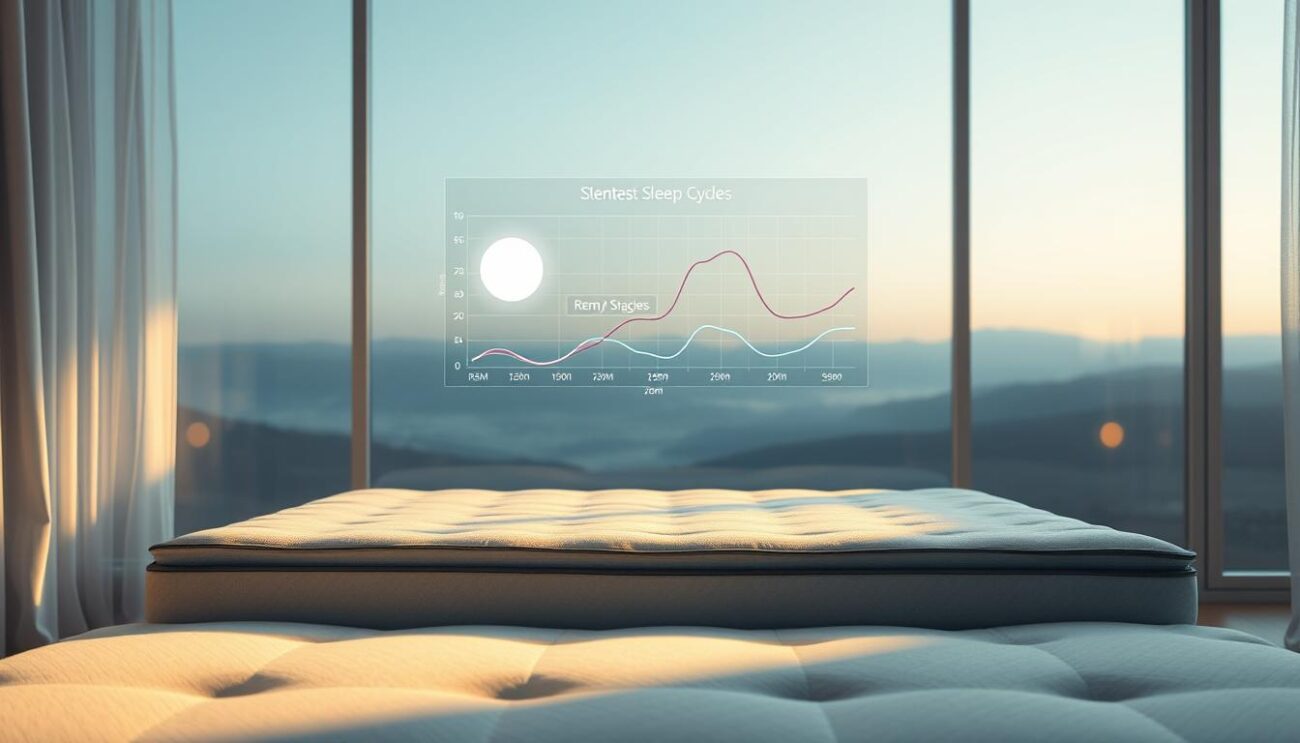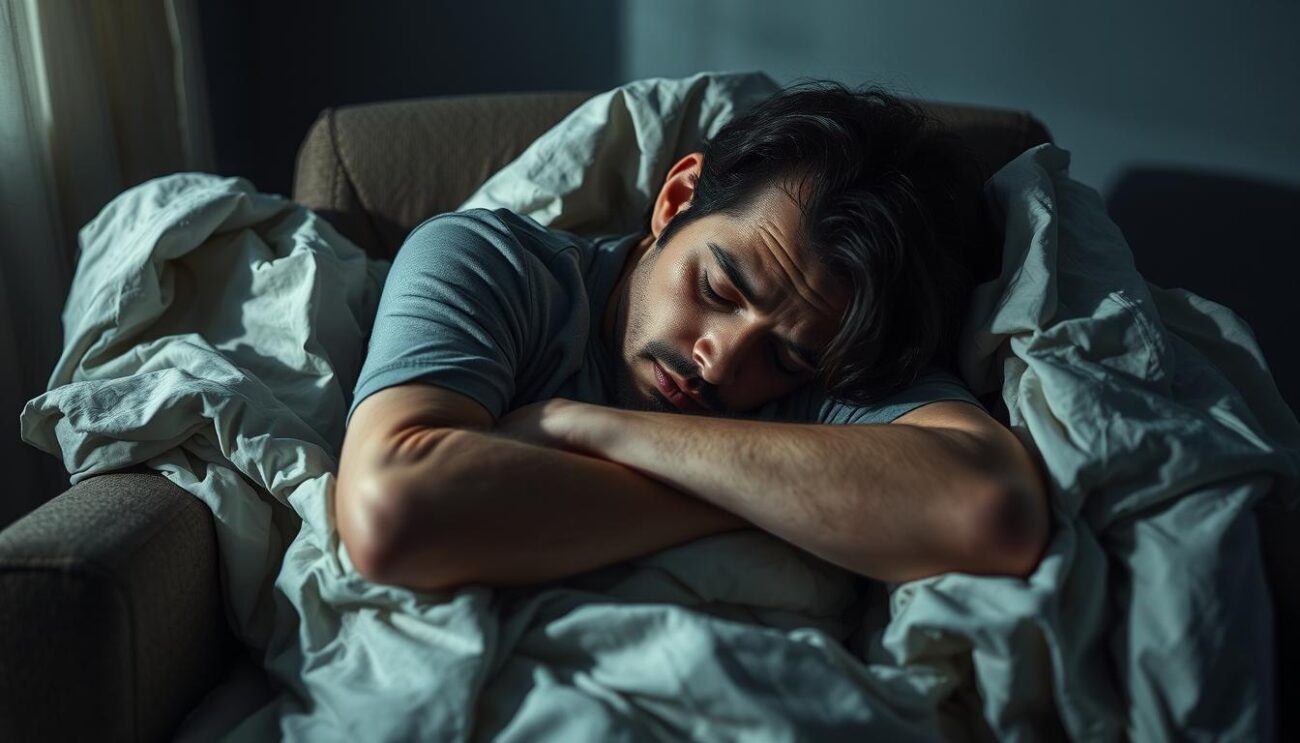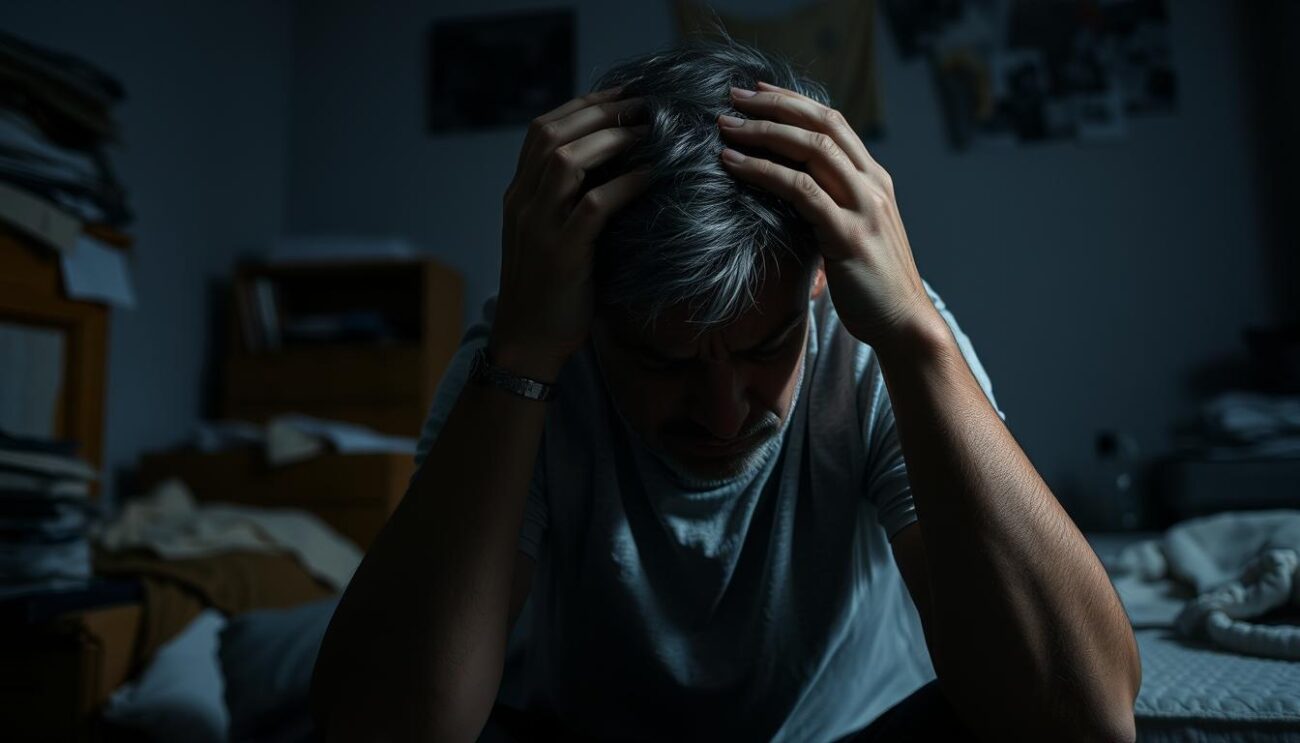Sleep deprivation is a big problem worldwide, affecting millions. It has serious effects on our health and minds.
The importance of sleep is huge. It’s key to our health. Not sleeping enough can cause many problems. These include bad thinking skills and a higher chance of getting sick.
The effects of sleep deprivation are wide-ranging. They affect our daily lives, how productive we are, and our overall happiness. Knowing the dangers of not sleeping enough is important. It helps us take steps to sleep better.
Key Takeaways
- Sleep deprivation affects millions worldwide, impacting physical and mental health.
- The importance of sleep cannot be overstated, with significant consequences for overall well-being.
- Understanding the effects of sleep deprivation is key to improving sleep hygiene.
- Impaired cognitive function and increased risk of chronic diseases are associated with sleep deprivation.
- Prioritizing sleep is essential for maintaining productivity and quality of life.
The Science of Sleep: Why Your Body Needs It
Sleep is not just a break for our bodies. It’s a complex process with different stages, like REM and non-REM sleep. These stages help us physically and mentally recharge.
Sleep Cycles and Their Functions
Sleep cycles are key to our health. A full cycle lasts about 90 minutes, mixing REM and non-REM sleep. REM sleep is when we dream vividly and solidify memories.
REM vs. Non-REM Sleep
Non-REM sleep breaks into three stages, each with unique brain waves. The third stage is vital for fixing and growing our bodies. As one expert says, “Sleep is the golden chain that ties health and our bodies together.” This restorative process is vital for overall well-being.
The Restorative Process
While we sleep, our body fixes damaged cells, builds bones and muscles, and boosts our immune system. This restorative process is key to keeping us healthy.

Recommended Sleep Duration by Age
How much sleep we need changes as we get older. Adults need 7-9 hours each night. Kids and teens need even more. Knowing these needs helps us stay healthy.
Cultural Sleep Patterns in India
In India, sleep habits are shaped by lifestyle and environment. Using electronic devices before bed can mess with sleep. As noted, “The way we sleep is deeply connected to our cultural practices and daily routines.”
Physical Health Consequences of Sleep Deprivation
Sleep deprivation can harm our physical health in many ways. It affects our immune system and increases the risk of chronic diseases. Not getting enough sleep makes our body work less well, causing health problems.
Weakened Immune System
Sleep deprivation weakens our immune system. Lack of sleep can make us more likely to get sick.
Increased Susceptibility to Illness
Research shows sleep deprivation raises our risk of getting sick. Our body can’t fight off germs as well when we’re tired.
Increased Risk of Chronic Diseases
Sleep deprivation also raises the risk of chronic diseases. This includes heart disease, diabetes, and metabolic syndrome.
Heart Disease and Hypertension
Chronic sleep deprivation can increase heart disease and hypertension risk. Sleep helps control stress hormones and repair heart damage.
Diabetes and Metabolic Syndrome
Sleep deprivation can also disrupt glucose regulation. This increases the risk of type 2 diabetes and metabolic syndrome.

Weight Gain and Obesity
Sleep deprivation can also lead to weight gain and obesity. This is due to hormonal imbalances caused by lack of sleep.
Hormonal Imbalances
Sleep is key to regulating hormones that control hunger and metabolism. Without enough sleep, these balances are disrupted, leading to weight gain.
Cognitive Impairment: How Your Brain Suffers
Sleep deprivation can deeply affect how well we think and function. It impacts our daily lives and overall health. When we don’t get enough sleep, our brain struggles to do its job.
Memory and Learning Deficits
Not getting enough sleep hurts our brain’s memory-making abilities. Sleep helps our brain sort and keep information. It moves it from short-term to long-term memory.
Impact on Knowledge Retention
Sleep is key for learning and keeping memories. Without enough sleep, we can’t hold onto new information well. This affects our school and work performance.
Reduced Concentration and Attention Span
Sleep loss makes it hard to focus and pay attention for long. It’s tough to stay on task, leading to less work done and less efficiently.
Performance Decline in Students
Students are hit hard by sleep loss. Not sleeping enough can hurt their grades. It makes it hard to focus and learn new things.
Decision-Making Abilities
Sleep loss messes with our brain’s decision-making skills. When we’re tired, we tend to make quick, rash decisions. These can lead to big problems.
Risk Assessment Impairment
Our ability to judge risks is also hurt by sleep loss. This can cause bad choices in our personal and work lives.

Emotional and Psychological Effects
Lack of sleep can really hurt your emotional and mental health. It can cause many issues that affect your daily life and health.
Mood Swings and Irritability
People who don’t get enough sleep often feel moody and irritable. This can make it hard to get along with others, both at work and at home. A trusted source says, “Sleep deprivation can lead to mood swings, anxiety, and depression.”
Anxiety and Depression Links
There’s a strong connection between not sleeping well and mental health problems like anxiety and depression. The relationship between sleep and mental health is complex. Sleep problems can make these conditions worse.
Sleep-Mental Health Cycle
The way sleep and mental health interact is two-way: bad sleep can cause mental health issues, and mental health problems can make sleep worse.
“The relationship between sleep and mental health is deeply intertwined, with each influencing the other.”
Stress Response Amplification
Not getting enough sleep can make your body’s stress response stronger. This makes it harder to handle stress. It can also raise cortisol levels, a stress hormone.
Cortisol Regulation
 When you don’t sleep well, cortisol levels can get out of balance. This leads to a stronger stress response.
When you don’t sleep well, cortisol levels can get out of balance. This leads to a stronger stress response.
It’s important to understand how sleep deprivation affects your emotions and mind. By making sleep a priority, you can improve your emotional and mental health.
The Hidden Dangers: Microsleeps and Accidents
Microsleeps are often overlooked but can cause serious accidents. They are short, unplanned naps that can happen anytime. When someone has a microsleep, they don’t notice their surroundings, leading to dangerous situations.
Workplace Safety Concerns
Microsleeps in the workplace are a big safety risk. Workers using heavy machines or in dangerous areas face a higher chance of accidents if they microsleep.
Productivity Loss Statistics
A study showed that microsleeps greatly reduce workplace productivity. The table below shows how much microsleeps affect work efficiency.
| Industry | Productivity Loss Due to Microsleeps | Annual Cost |
|---|---|---|
| Manufacturing | 12% | $1.2 million |
| Transportation | 15% | $2.5 million |
| Healthcare | 8% | $800,000 |
Driving Risks on Indian Roads
Driving with microsleeps is extremely dangerous and can cause fatal crashes. Indian roads, with their varied traffic, need drivers to stay alert all the time.
Sleep-Related Accident Data
Recent data shows that sleep-related crashes are a big part of road accidents in India. The numbers are scary and show we need to know more about microsleep dangers.
Public Safety Implications
Microsleeps affect not just individual safety but also public safety. It’s important to find and fix the causes of microsleeps, like not getting enough sleep, to lower these risks.
Common Sleep Disorders in the Indian Population
Many Indians don’t know about sleep disorders that harm their quality of life. These disorders are common and can seriously affect our health. They can also impact our daily life, work, and overall happiness.
Insomnia Prevalence and Causes
Insomnia is a big problem in India. It makes it hard to fall asleep or stay asleep. Stress, anxiety, and lifestyle choices can cause insomnia.
Sleep Apnea and Breathing Disorders
Sleep apnea affects breathing while sleeping. It can cause poor sleep and low oxygen levels, leading to heart problems. It’s often linked to being overweight, smoking, and getting older.
Restless Leg Syndrome
Restless Leg Syndrome (RLS) is a disorder that makes you want to move your legs. It’s caused by uncomfortable feelings. RLS can ruin your sleep and is related to genetics, iron levels, and some medicines.
Diagnosis and Treatment Options
Doctors use medical history, physical checks, and sleep studies to diagnose sleep disorders. Treatment depends on the disorder. It might include changing your lifestyle, therapy, or using special machines for sleep apnea.
Long-Term Consequences You Can’t Ignore
Sleep deprivation has many long-term effects that can harm your health. It can lead to serious health issues that aren’t obvious at first but can be very harmful over time.
Accelerated Aging
Sleep is key for the body’s repair and growth. It helps fix damaged cells, build bones and muscles, and boost the immune system. Without enough sleep, these processes can be disrupted, causing accelerated aging at the cellular level.
Cellular and DNA Damage
Lack of sleep can damage cells and DNA, leading to early aging. This damage can shorten telomeres, the protective caps on chromosomes, speeding up aging.
Cognitive Decline and Dementia Risk
Sleep is vital for brain health. Prolonged sleep deprivation can cause cognitive decline. It hampers the brain’s ability to clear beta-amyloid plaques, a sign of Alzheimer’s disease, raising dementia risk.
Brain Health Deterioration
Sleep deprivation can harm brain health, causing memory loss, trouble learning new things, and poor problem-solving skills. This can greatly affect one’s quality of life over time.
Shortened Lifespan
Chronic sleep deprivation can increase the risk of death. It can lead to various health problems that shorten one’s life.
Mortality Risk Factors
Research shows that long-term sleep deprivation raises the risk of heart disease, diabetes, and other serious conditions. These conditions are linked to a higher risk of death. The table below summarizes some key findings.
| Condition | Risk Increase | Study Findings |
|---|---|---|
| Cardiovascular Disease | 30% | Associated with chronic sleep deprivation |
| Diabetes | 25% | Linked to prolonged sleep deprivation |
| Mortality | 20% | Increased risk due to sleep deprivation |
In conclusion, the long-term effects of sleep deprivation are severe and can have a lasting impact on health and wellbeing. It is essential to prioritize sleep to avoid these risks.
A Lack of Sleep Affects You More Than You Know: The Ripple Effect
Not getting enough sleep can affect many areas of our lives. It impacts our relationships, work, and overall happiness. Sleep deprivation affects us in many ways, touching nearly every part of our lives.
Impact on Relationships
Sleep loss can strain our personal and work relationships. When we’re tired, we might get irritable and less patient. This can lead to problems in communication.
Communication Breakdown
Not sleeping well can make it hard to talk clearly. We might not listen well and could misunderstand others. Dr. Walker, a sleep expert, says sleep is key for emotional smarts. A study shows sleep-deprived people often fight more because they can’t control their emotions.
Professional Performance Decline
Not sleeping well can hurt our work life. It makes us less productive and affects our decision-making.
Career Advancement Implications
Long-term sleep loss can slow down our career growth. A survey found that well-rested employees get promoted more. They’re seen as more capable by their colleagues.
Quality of Life Reduction
Sleep loss also lowers our life quality. When we’re tired, we don’t enjoy activities as much. This makes us less fulfilled.
Enjoyment and Fulfillment Decrease
Sleep is key to enjoying life. As the National Sleep Foundation says, “Sleep is vital for our body and mind.” Without enough sleep, we can’t fully enjoy life’s pleasures.
| Aspect of Life | Effect of Sleep Deprivation |
|---|---|
| Relationships | Strained due to irritability and communication breakdowns |
| Professional Performance | Decline in productivity and decision-making abilities |
| Quality of Life | Decrease in enjoyment and fulfillment |
“Sleep is the foundation upon which our emotional intelligence is built.” –
Modern Lifestyle Factors Affecting Sleep in India
Modern lifestyle changes in India are impacting sleep. These changes include technology, culture, and environment. As India becomes more urban and modern, these factors are key to sleep quality.
Technology and Screen Time
Smartphones and digital devices have increased in India. This has led to more screen time, which can disrupt sleep patterns.
Smartphone Usage Patterns
Indians spend a lot of time on their phones, even at night. This delays sleep and lowers sleep quality due to blue light.
Work Culture and Pressures
India’s work culture, like in the IT sector, often requires late hours and stress. This can harm sleep patterns and lead to deprivation.
IT Industry and Night Shifts
The IT sector in India often demands night shifts. This can cause long-term sleep issues for IT workers.
Environmental Factors
Noise and air pollution in Indian cities can affect sleep. Overcrowding and poor ventilation in homes also worsen sleep quality.
Noise and Air Pollution
Noise from traffic and construction, along with air pollution, makes it hard to sleep well.
Urban Housing Challenges
Small living spaces and poor insulation in urban homes contribute to poor sleep quality.
In conclusion, modern lifestyle factors in India, like technology, work culture, and environment, greatly impact sleep. It’s important to address these issues to improve sleep health.
| Factor | Impact on Sleep |
|---|---|
| Technology and Screen Time | Delays sleep, affects sleep quality |
| Work Culture and Pressures | Disrupts normal sleep patterns, leads to sleep deprivation |
| Environmental Factors | Makes it difficult to fall asleep, poor sleep quality |
Effective Strategies to Improve Sleep Quality
To improve sleep quality, we need to tackle it from many angles. This includes making our sleep space better and changing our lifestyle. By doing these things, we can greatly enhance our sleep and feel better overall.
Creating the Ideal Sleep Environment
The environment where we sleep is key to good sleep. Things like temperature, light, and noise can either help or hurt our sleep.
Temperature and Lighting Optimization
Keeping our bedroom cool, between 60-67°F (15-19°C), helps us sleep better. Also, a dark room helps our body’s natural sleep cycle. Blackout curtains or blinds can make the room dark.
Key considerations for the sleep environment:
- Keep the bedroom cool and dark
- Invest in a comfortable mattress and pillows
- Minimize noise levels
Lifestyle Adjustments
Changing our lifestyle can also improve sleep. This includes what we eat, how much we exercise, and our daily routines.
Diet and Exercise Considerations
Eating light meals before bed and staying active can help sleep. But, avoid hard exercise close to bedtime as it can wake us up.
Ayurvedic and Traditional Approaches
Using traditional methods like Ayurveda and yoga can also help. These focus on balance and natural living for better sleep.
Ayurvedic tips for better sleep:
- Practice yoga or meditation before bed
- Use herbal remedies like ashwagandha
- Follow a consistent sleep schedule
When to Seek Professional Help
If we can’t sleep well even with lifestyle changes and a good sleep space, we might need professional help.
Available Sleep Medicine Resources in India
India has many sleep medicine resources, like clinics and specialists. Talking to a healthcare expert can give us tailored advice and treatments for sleep issues.
Conclusion: Prioritizing Sleep for Overall Wellbeing
Prioritizing sleep is key for overall wellbeing. Studies show that enough sleep is vital for physical and mental health. It also boosts cognitive function and quality of life. By focusing on sleep, people can greatly improve their wellbeing.
Creating a consistent sleep schedule and a cozy sleep environment are simple steps. Avoiding stimulating activities before bed also helps. These habits can make sleep better and improve daily life.
Understanding sleep’s importance and making it a priority is a proactive step. It leads to better physical and mental health. It also increases productivity and enhances life quality.
FAQ
What are the immediate effects of sleep deprivation on the body?
Not getting enough sleep weakens your immune system. It also raises the risk of chronic diseases. Plus, it can cause weight gain due to hormonal changes and increased hunger.
How does sleep deprivation affect cognitive function?
Lack of sleep hurts your memory and learning. It makes it hard to focus and pay attention. It also makes making decisions more difficult, making everyday tasks tough.
What are the emotional and psychological effects of sleep deprivation?
Not sleeping well can cause mood swings and anxiety. It can also lead to depression and stress. These effects harm your mental health.
What are microsleeps, and how do they impact safety?
Microsleeps are short, involuntary naps. They can happen anytime. They’re dangerous, affecting safety at work, while driving, and in public, like on Indian roads.
What are some common sleep disorders prevalent in India?
In India, common sleep issues include insomnia, sleep apnea, and restless leg syndrome. These problems can greatly affect your life and health.
How does sleep deprivation affect long-term health?
Not sleeping enough can make you age faster. It can also lead to cognitive decline and shorten your life. This shows how important sleep is.
How does sleep deprivation impact daily life and relationships?
Lack of sleep can harm your relationships and work performance. It affects your overall life quality, causing problems that spread far.
What modern lifestyle factors contribute to sleep deprivation in India?
Technology, work culture, and the environment play big roles in sleep loss in India. It’s key to find ways to fight these effects.
What are some effective strategies to improve sleep quality?
To sleep better, create a good sleep space. Make lifestyle changes. And, if needed, get help from a professional. These steps are vital for better sleep and health.
How can I determine if I need professional help for my sleep issues?
If you keep having sleep problems like insomnia or feeling very tired during the day, see a doctor. They can find the cause and suggest treatments.






